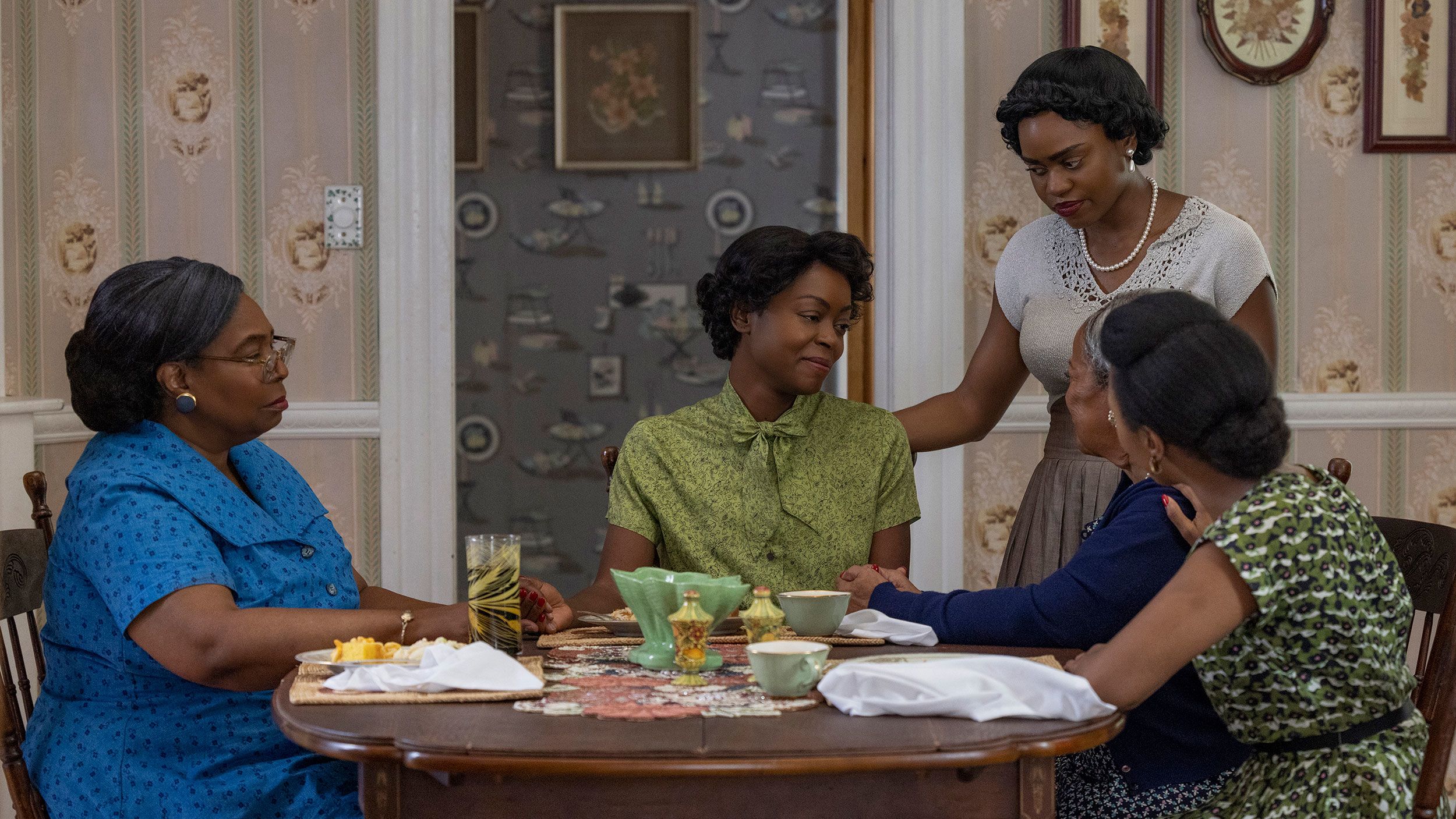Till (United States, 2022)
November 09, 2022
The key to effectively dramatizing a tragedy like the one at the center of Till is to avoid the slightest whiff of exploitation. The events surrounding the death of 14-year old Emmett Till on August 28, 1955 are well documented. Prior to that fateful date, he was just another ordinary Black teenager. After that date, due in large part to the tireless efforts of his bereaved mother, he became a posthumous Civil Rights icon. When reading plaques and citations commemorating Emmett’s importance to the movement, it’s easy to lose sight of the humanity and its attendant currency of pain, grief, and tears. Director Chinonye Chukwu seeks to restore the balance between the character’s historical importance and the personal impact his life – and death – had upon his family.
The movie opens with a seemingly benign half-hour introductory section that provides glimpses into the happy life shared by Emmett (Jalyn Hall) and his loving mother, Mamie (Danielle Deadwyler). The movie explores the normalcy of their domestic arrangement, also introducing supporting characters like Mamie’s mother, Alma (Whoopi Goldberg), and her fiancé, Gene Mobley (Sean Patrick Thomas). There’s no foreshadowing of what is to come. We see Emmett as a happy, well-adjusted teenager who rolls his eyes at some of his mother’s sterner pronouncements. It’s 1955 and racism is evident even in the cosmopolitan city of Chicago…but it’s nothing like what Emmett encounters when he goes on a vacation to visit his cousins in rural Mississippi.
The film’s darkest moments occur in the Deep South, where Emmett’s lack of familiarity with the unwritten rules governing the interactions between Black folk and whites paves the way for his death. He makes the mistake of addressing a young white woman with too much familiarity – a brazenness that incites her husband to violence. Emmett is kidnapped at gunpoint from his great-uncle’s house, taken to another location, and lynched.
 After Emmett’s disappearance, the focus shifts to Mamie. Her
fear and worry for her son’s safety turns to an all-consuming grief when his
body is found floating in the Tallahatchie River. She demands that Mississippi
ship home her son’s corpse and, when it arrives, she demands to see it. His
subsequent open-coffin funeral receives mass media attention (especially from
the Black press), bequeathing Mamie with a kind of celebrity status.
Accompanied by her father, John (Frankie Faison), Mamie travels to Mississippi
to testify at the trial of her son’s accused killers. While there, she meets famed
Civil Rights advocate Medgar Evers (Tosin Cole) and becomes involved in the
nationwide movement.
After Emmett’s disappearance, the focus shifts to Mamie. Her
fear and worry for her son’s safety turns to an all-consuming grief when his
body is found floating in the Tallahatchie River. She demands that Mississippi
ship home her son’s corpse and, when it arrives, she demands to see it. His
subsequent open-coffin funeral receives mass media attention (especially from
the Black press), bequeathing Mamie with a kind of celebrity status.
Accompanied by her father, John (Frankie Faison), Mamie travels to Mississippi
to testify at the trial of her son’s accused killers. While there, she meets famed
Civil Rights advocate Medgar Evers (Tosin Cole) and becomes involved in the
nationwide movement.
Chukwu’s approach to the subject matter is unflinching without being overly reverential. One key artistic decision is not to show the torture, mutilation, and killing of Emmett, expressing that the depiction of such extreme violence could amount to exploitation (a similar controversy arose in association with The Passion of the Christ; director Mel Gibson had a different take). Chukwu relies on the viewer’s imagination to fill in the blanks. She provides a soundtrack (Emmett’s screams can be heard in the background) and haunting visuals outside of the location as the murder transpires. She also doesn’t hide the body – broken from the assault and bloated from days in the river – from the camera. Nothing more is required to illustrate the kind of hell that Emmett endured during his final hours.
 There’s nothing fun or entertaining about watching Till.
The naked gaze of Chukwu’s account goes against the grain of what mainstream
audiences expect from today’s cinema. Despite the PG-13 rating, the narrative
is raw and brutal. The emotions, especially those of Mamie as embodied in a
breathtaking performance by Danielle Deadwyler (in her first motion picture
lead role; she has an extensive TV resume), are unfiltered. When it comes to
ending Till, the filmmakers are faced with a dilemma because history
does not provide a natural stopping point. If there’s a flaw, it’s that there’s
an artificiality to the “uplifting” final scenes that isn’t helped by the
overbearing (and far too intrusive) score credited to Abel Korzeniowski.
There’s nothing fun or entertaining about watching Till.
The naked gaze of Chukwu’s account goes against the grain of what mainstream
audiences expect from today’s cinema. Despite the PG-13 rating, the narrative
is raw and brutal. The emotions, especially those of Mamie as embodied in a
breathtaking performance by Danielle Deadwyler (in her first motion picture
lead role; she has an extensive TV resume), are unfiltered. When it comes to
ending Till, the filmmakers are faced with a dilemma because history
does not provide a natural stopping point. If there’s a flaw, it’s that there’s
an artificiality to the “uplifting” final scenes that isn’t helped by the
overbearing (and far too intrusive) score credited to Abel Korzeniowski.
This is not a “woke” movie. It is an honest depiction of an American tragedy. It forces us to remember a time that many would prefer to forget. I have heard concerns voiced that white audiences may shun Till. There may be some truth to this – when I saw it at a public showing, there were 12 people in the audience and I was the only white one. But this is a shared history and everyone is better off learning about it, understanding it, and recognizing how it has contributed to the pathway through the second half of the 20th century and on to today. Movie-going isn’t a civics assignment but Till is a sufficiently powerful motion picture that it offers more than a history lesson.
Till (United States, 2022)
Cast: Danielle Deadwyler, Jalyn Hall, Whoopi Goldberg, Sean Patrick Thomas, John Douglas Thompson, Frankie Faison, Tosin Cole, Haley Bennett
Home Release Date: 2023-01-17
Screenplay: Michael Reilly & Keith Beauchamp and Chinonye Chukwu
Cinematography: Bobby Bukowski
Music: Abel Korzeniowski
U.S. Distributor: United Artists
U.S. Home Release Date: 2023-01-17
MPAA Rating: "PG-13" (Implied Violence, Racial Epithets, Adult Themes)
Genre: Drama
Subtitles: none
Theatrical Aspect Ratio: 2.35:1
- Piano Lesson, The (2024)
- (There are no more better movies of Danielle Deadwyler)
- (There are no more worst movies of Danielle Deadwyler)
- (There are no more better movies of Jalyn Hall)
- (There are no more worst movies of Jalyn Hall)
- Lion King, The (1994)
- Girl, Interrupted (1999)
- (There are no more better movies of Whoopi Goldberg)

Comments